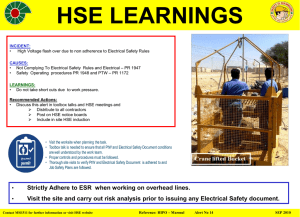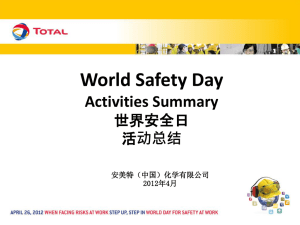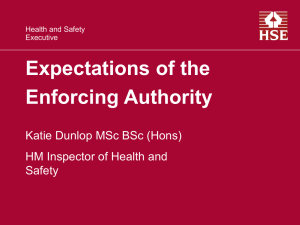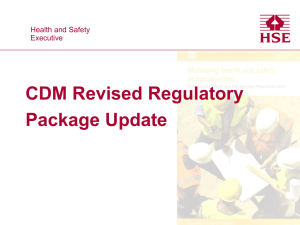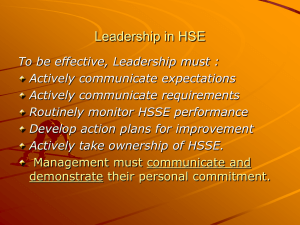DWF Corporate PPT Template
advertisement
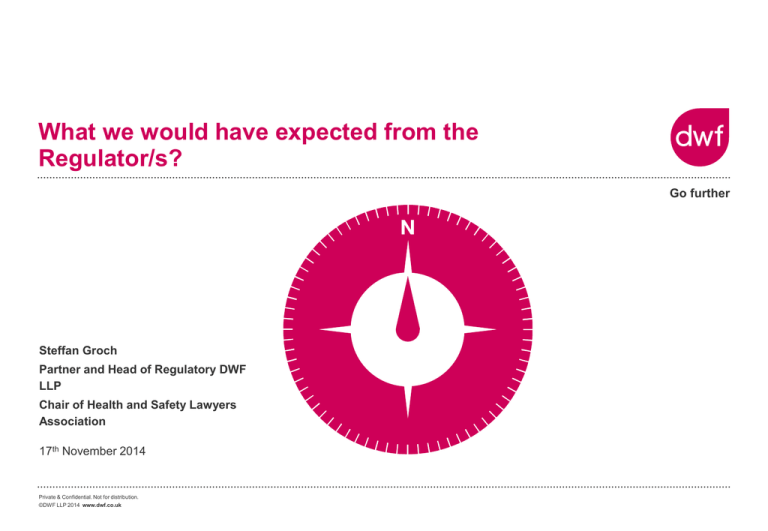
What we would have expected from the Regulator/s? Go further Steffan Groch Partner and Head of Regulatory DWF LLP Chair of Health and Safety Lawyers Association 17th November 2014 Private & Confidential. Not for distribution. ©DWF LLP 2014 www.dwf.co.uk School Trips & the Health and Safety at Work Act 1974 (HSWA) • The HSWA Act is the key law relating to school trips. It requires employers to ensure the health and safety of their employees and non-employees, so far as is reasonably practicable. • It also places duties on individuals to take care for the health and safety of themselves and others. • The Act is supplemented by the following regulations – the Management of Health and Safety Regulations 1999, which require employers to undertake risk assessments and put measures in place to control the significant risks; – the Adventure Activities Licensing Regulations 2004, which require certain providers of facilities for adventure activities to be licensed. (The term adventure activity is broadly defined as caving, climbing, trekking or water sports. Providers offering and charging for these types of activities to those under 18 must be licensed. Adventure activities abroad do not have to be licensed) Private & Confidential. Not for distribution. ©DWF LLP 2014 www.dwf.co.uk 2 The Health and Safety Executive (HSE) as the Regulator • HSE is very often the enforcing authority for sites run by educational providers, including all centres run by local authorities. In many cases, the employer will be the local authority; in other cases, it will be the governing body or proprietor of the school. • The employer has the overall legal responsibility and accountability for the health, safety and welfare for the school staff, and for the health and safety of pupils, visitors and volunteers. • Health and safety functions (but not accountability) can be delegated to members of staff within the school to fulfil health and safety responsibilities on behalf of the employer. Private & Confidential. Not for distribution. ©DWF LLP 2014 www.dwf.co.uk 3 Corporate and Individual responsibility • Overall responsibility for health and safety lies with the employer. Therefore main duties are on the employer, not teachers or head teachers. • Head teachers and the school management team/manager have considerable autonomy in the day-to-day running of their schools and it is important this is exercised in line with the employer’s policies, procedures and standards. • Teachers organising and taking part in school visits off-site accept responsibility for the care and welfare of pupils, and they act in loco parentis. They will also have duties as employees and/or managers under health and safety at work legislation. • Teachers will only become personally liable if they ignore clear, direct, instructions about serious risks and depart from reasonable care….section 7 HSWA Private & Confidential. Not for distribution. ©DWF LLP 2014 www.dwf.co.uk 4 Duties as an employee • The law requires employees to: • take reasonable care of their own health and safety and that of others who may be affected by what they do at work; • co-operate with their employers on health and safety matters; • do their work in accordance with training and instructions; and • inform the employer of any work situation representing a serious and immediate danger, so that remedial action can be taken. • In addition, teachers and other staff in schools have a common law duty to act as any prudent parent would do when in charge of pupils. • Employees should follow any health and safety procedures put in place by their employer. Private & Confidential. Not for distribution. ©DWF LLP 2014 www.dwf.co.uk 5 What should you expect? • On the day of the accident or very soon after this it is usual for the HSE to interview anyone who may have witnessed the accident to understand how it happened. These interviews are voluntary and initially statements are taken from those who have actually witnessed the incident or were near the scene of the accident. Consider how quickly you can interview witnesses…… • Expect to be asked to hand over documentation, incl your own investigation report – so consider legal professional privilege before embarking upon your own investigation! • The scope of the HSE investigation will also include examination of broader issues such as any circumstances relating to activities carried out to support a particular visit which may reveal systemic failings in the management of school trips. This could include general management arrangement, risk assessments for the activities, training and competence of staff, co-operation and co-ordination with other parties. • Investigations can/will take many months. Private & Confidential. Not for distribution. ©DWF LLP 2014 www.dwf.co.uk 6 Interviews • There are three types of interviews which may occur during the course of an HSE investigation • (1) Voluntary interviews • These are interviews at which the Police and/or the HSE will take a written statement. They are voluntary in nature and you cannot be forced to make a statement. It is usual to co-operate as far as possible (unless you have no knowledge of something and you think the Police/HSE may be interviewing the wrong person) • (2) Compulsory interviews by HSE under Section 20 of the Health & Safety at Work Act (HSWA) • In most cases, HSE Inspectors will take voluntary statements. However, the HSE (not the Police) also have the power to take statements under Section 20 of the HSWA. If the Inspector uses this power, you are legally obliged to attend the interview and answer questions to which you know the answers. In such circumstances, you have the right to be accompanied by a colleague. Although there is no specific right to have a solicitor present, you can request one and the HSE is unlikely to refuse unless they believe it would obstruct the investigation. • (3) Interviews under caution. • If the Police/HSE believes that an offence may have been committed, then they are likely to ask the appropriate individual to an interview under caution, a formal interview which is generally conducted at an HSE office. Private & Confidential. Not for distribution. ©DWF LLP 2014 www.dwf.co.uk 7 The Decision whether to prosecute • The HSE will then consider all the material (statements/ documents/ video footage) which has been gathered during the course of the investigation. • The HSE will then take a view on whether there is sufficient witness evidence or documentary evidence to lay criminal charges against the employer/individual(s) under health and safety legislation. • No prosecution may go ahead unless the prosecutor finds there is sufficient evidence to provide a realistic prospect of conviction, and decides that prosecution would be in the public interest. Private & Confidential. Not for distribution. ©DWF LLP 2014 www.dwf.co.uk 8 Powers of enforcement available • Improvement or Prohibition Notices – Beware the knee jerk reaction – Careful balance between reacting responsibly to the incident and over-reacting • Notice of Contravention/FFI – £124 per hour – Beware accepting the NOC; if you feel it is over stated then say so • Prosecution of employer and/or employee – More likely the more serious the case – More likely if you accept IN/PN/NOCs – More likely if you over-react Private & Confidential. Not for distribution. ©DWF LLP 2014 www.dwf.co.uk 9 Prosecution • If prosecuted the courts can impose:– Substantial fines (which extend to unlimited fines in the higher courts) – Imprisonment – even for HSWA cases! – Director Disqualification – very rare • Reputational issues • Hse are increasingly being expected to justify their time spent on cases, either by prosecuting or by recovering their time through FFI Private & Confidential. Not for distribution. ©DWF LLP 2014 www.dwf.co.uk 10 Other indirect issues • Dealing with the ‘traditional’ media • Social media – Facebook – Instagram – twitter • OFSTED • Stress and associated issues with witnesses and staff who have seen the incident and therefore required to give evidence at hearings/prosecutions etc – How do you handle them? Private & Confidential. Not for distribution. ©DWF LLP 2014 www.dwf.co.uk 11 Go further° DWF is the legal business where expertise, industry knowledge and leading edge technology converge to deliver solutions that enable our clients to excel. Embracing our diverse skills, we gain a unique and more valuable legal perspective that can empower our clients, giving them a competitive advantage or simply delivering new solutions to old problems. With over 2,500 people across the UK and Ireland, we make sure that wherever you are, wherever you aim to be, we will go further to help you get there. ©DWF LLP 2014 DWF LLP is a limited partnership registered in England and Wales with registered number OC328794. The content of the Regulatory and Licensing Insert does not constitute legal advice and should not be relied on as such. Specific advice should be sought about your specific circumstances. www.dwf.co.uk

